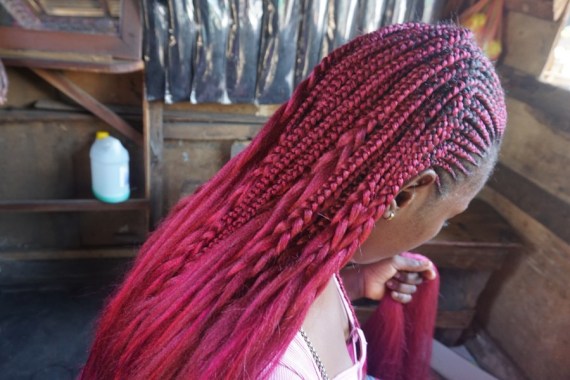By Xinhua
LUSAKA, Sept. 5 (Xinhua) — Hair-braiding skills have emerged as a powerful means of income generation for young women in Zambia in recent years.
This traditional art form, deeply rooted in African culture, has not only created employment opportunities but also offered financial independence for women in different parts of the country. Young women no longer see hair braiding as a mere passion or hobby but as a means to earn a living.
Among those who are benefiting from hair braiding skills is 27-year-old Judith Brown who specializes in sisterlocks braids, a hairstyle appreciated by those seeking to maintain a natural look.
Brown who hails from Ndola, Copperbelt region of Zambia, has since turned part of her home into a salon and built a substantial loyal customer base through her social media platform called Judy’s Sisterlocks Zambia.
“I have always been passionate about braiding and styling hair and so I decided to teach myself how to do sisterlocks through online tutorials three years ago,” she said.

This photo taken on Aug. 17, 2023 shows a young lady’s new cornrows hairstyle with synthetic hair extensions in Lusaka, Zambia. (Photo by Lillian Banda/Xinhua)
According to Brown, the demand for hair braiding services has led to an increased interest in braiding techniques, opening up doors of opportunity for young women like her across the country. “I earn money to supplement the income of my household as well for savings,” she said.
Barbara Phiri, 23, based in Lusaka, Zambia’s capital, expressed her gratitude for the opportunity hair braiding has provided her.
Phiri who operates from Kamwala trading area of Lusaka said that she has been involved in hair braiding since she was a young teenager and the skill enabled her to pay her school fees among other things.
“The income I generate from hair braiding has not only allowed me to pay school fees but also invest in my future aspirations,” she said, adding that she started braiding hair in 2015 as a hobby and now she earns an average of 150 Zambian Kwacha (about 7.5 U.S. dollars) per day from the skill.
Emily Nachalwe, who works from an open space within Railway Market in Kabwe town, central Zambia, said hair braiding is not only supplementing household incomes but also helping a lot of younger mothers out of poverty.
“I am able to provide (money) for the needs of children as well as for a few extended family members. My daily income is around 200 to 300 Zambian Kwacha,” the mother of three said.
There are several braiding techniques that are currently in high demand among clients in Zambia. Most braiding styles involve adding extensions to the natural hair, thereby creating a thick look. ■









